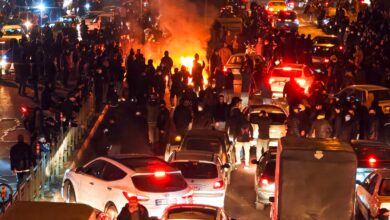Jerusalem–Israel launched its biggest air raid exercise Sunday to test its preparedness against possible missile strikes from Iranian-sponsored militant groups as international tensions rose over Tehran’s nuclear program.
Israel has called for strong economic sanctions against Iran over its nuclear plans but, in a hint of possible military action, has said all options were on the table should diplomacy fail to resolve the dispute.
Israeli officials said the exercise, which will include sounding air raid sirens Wednesday, would focus on municipal authorities’ responses to a scenario in which missiles were launched from the Gaza Strip, controlled by Hamas Islamists, and by Hizbullah guerrillas in Lebanon. Both are allies of Iran.
In public remarks at the start of the weekly cabinet meeting Sunday, Prime Minister Benjamin Netanyahu described Israel’s biggest civil defense exercise as a routine, protective move and said the government sought only “quiet, stability and peace.”
The air raid sirens will sound Wednesday nationwide in a signal to Israelis to take cover in shelters or designated secure areas for 10 minutes, and much of the public is expected to take part in this drill.
In a test of an emergency warning system, the military’s Home Front Command will also send text messages that read — “Have a nice day” — to cellphone owners in certain areas of the country, the army said in a statement to test communications.
Rescue services will be put on a practice emergency footing, while a partial distribution of gas masks is also planned, in addition to air raid drills to be held at schools and hospitals.
The five-day drill dubbed “Turning Point 4” has sparked nervousness in the region as diplomatic efforts intensify to curb Iran’s nuclear ambitions, which the West and Israel believe are aimed at building atomic weapons.
Iran denies its uranium enrichment program is a quest for nuclear arms and says it is purely for power. Israel is widely believed to have the Middle East’s only nuclear arsenal.
Itamar Rabinovitch, an expert on Middle East affairs and a former Israeli ambassador to Washington, said Israel must prepare for the possibility Iranian leaders would encourage Hamas and Hizbullah to fire on Israel in the event of stiffer UN sanctions against Iran.
“We must show we don’t intend to be sitting ducks in the event of such an attack,” Rabinovitch said.
Hizbullah fired more than 4,000 rockets into Israel during the 2006 Lebanon war. Hamas carried out numerous cross-border rocket attacks in the past, and Israel launched a war in the Gaza Strip in late 2008 with the aim of ending such strikes.
Israel has held a country-wide civil defense exercise annually for the past three years and military officials said the current drill is the most extensive in its 62-year history.
Hizbullah rockets did cause significant casualties during the Lebanon war, and Israeli officials have said that since the conflict ended, the group has bolstered its arsenal with more powerful and longer-range weapons.
Rockets fired from the Gaza Strip have rarely caused fatalities in Israel and carry a relatively small warhead. But Hamas has said it now has rockets that can reach deep into Israel.




